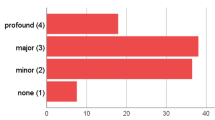Abstract
The purpose of this study was to describe how three primary teachers attempted to overcome incomplete content knowledge when teaching an astronomy unit. Daily observations of science activities were videotaped and transcribed from each classroom to determine the influences on the changes in teacher and student ideas of astronomy. Teachers' ideas were triggered toward the more scientific by classroom interactions. Influences on the experienced teachers' ideas were questions raised by the students, or conceptions students held of the content. Experienced teachers planned to elicit and address student ideas, and so were triggered to improve their understanding of the astronomy.
Similar content being viewed by others
References
Abell, S. K., & Roth, M. (1992). Constraints to teaching elementary science: A case study of a science enthusiast student teacher. Science Education, 76, 581–595.
Akerson, V. L., & Flanigan, J. (2000). Preparing preservice teachers to use an interdisciplinary approach to science and language arts instruction. Journal of Science Teacher Education, 11, 287–313.
Akerson, V. L., Flick, L. B., & Lederman, N. G. (2000). The influence of young children's ideas in science on teaching practice. Journal of Research in Science Teaching, 37, 363–385.
American Association for the Advancement of Science. (1993). Benchmarks for science literacy. New York: Oxford University Press.
Berliner, D. C. (1987). Ways of thinking about students and classrooms by more and less experienced teachers. In J. Calderhead (Ed.), Exploring teachers' thinking (pp. 101–124). London: Cassell.
Borko, H. (1993). The integration of content and pedagogy in teaching. In A. L. Gardner & K. F. Cochran (Eds.), Critical issues in reforming elementary teacher preparation in mathematics and science (pp. 25–45). Greeley, CO: University of Colorado.
Bromme, R. (1987). Teachers' assessments of students' difficulties and progress in understanding in the classroom. In J. Calderhead (Ed.), Exploring teachers' thinking (pp. 125–146). London: Cassell.
Cazden, C. B. (2001). Classroom discourse: The language of teaching and learning (2nd ed.). Portsmouth, NH: Heinemann.
Cortazzi, M. (1993). Narrative analysis. London: Palmer Press.
Dickinson, V. L., Burns, J., Hagen, E. R., & Locker, K. M. (1997). Becoming better primary science teachers: A description of our journey. Journal of Science Teacher Education, 8, 295–311.
Dickinson, V. L., & Flick, L. B. (1996). How to succeed in physics without really crying. Science and Children, 33(8), 37–38.
Driver, R., Guesne, E., & Tiberghien, A. (1985). Children's ideas in science. Milton Keyes, UK: Open University Press.
Edwards, D. (1993). But what do children really think?: Discourse analysis and conceptual content in children's talk. Cognition and Instruction, 11, 207–225.
Edwards, D., & Mercer, N. (1987). Common knowledge: The development of understanding in the classroom. London: Meuthen.
Flick, L. B. (1995). Navigating a sea of ideas: Teacher and students negotiate a course toward mutual relevance. Journal of Research in Science Teaching, 32, 1065–1082.
Gallas, K. (1995). Talking their way into science: Hearing children's questions and theories, responding with curricula. New York: Teachers College Press.
Harlen, W. (1997). The teaching of science in primary schools. London: David Fulton.
Harlen, W., & Holroyd, C. (1997). Primary teachers' understanding of concepts of science: Impact on confidence and teaching. International Journal of Science Education, 19, 93–105.
Hollingsworth, S. (1989). Prior beliefs and cognitive change in learning to teach. American Educational Research Journal, 26, 160–189.
Jones, M. G., Carter, G., & Rua, M. J. (1999). Children's concepts: Tools for transforming science teachers' knowledge. Science Education, 83, 545–557.
Lemke, J. L. (1990). Talking science: Language, learning, and values. Norwood, NJ: Ablex Publishing Corporation.
Loucks-Horsley, S. (1996). The Concerns-Based Adoption Model (CBAM): A model for change in individuals. In R. Bybee (Ed.), National standards and the science curriculum. Dubuque, IA: Kendall/Hunt.
Neale, D. C., Smith, D., & Johnson, V. G. (1990). Implementing conceptual change teaching in primary science. The Elementary School Journal, 91, 109–131.
Osborne, J. (1991). Approaches to the teaching of AT16 – The Earth in space: Issues, problems, and resources. School Science Review, 72(260), 7–15.
Osborne, R., & Freyburg, P. (1985). Learning in science: The implications of children's science. Auckland, NZ: Heinemann.
Palinscar, A. S. (1986). The role of dialogue in providing scaffolded instruction. Educational Psychologist, 21, 73–98.
Palinscar, A. S. (1998). Keeping the metaphor of scaffolding fresh – A response to C. Addison Stone's “The metaphor of scaffolding: It's utility for the field of learning disabilities”. Journal of Learning Disabilities, 31, 37–373.
Perkes, V. A. (1975). Relationships between a teacher's background and sensed adequacy to teach elementary science. Journal of Research in Science Teaching, 12, 85–88.
Piaget, J. (1929). The child's conception of the world. New York: Harcourt Brace.
Resnick, L. B., Salmon, M., Zeitz, C. M., Wathen, S. H., & Holowchak, M. (1993). Reasoning in conversation. Cognition and Instruction, 11, 347–364.
Shulman, L. S. (1986). Those who understand: Knowledge growth in teaching. Educational Researcher, 15, 4–14.
Shulman, L. S. (1987). Knowledge and teaching: Foundations of the new reform. Harvard Educational Review, 57(1), 1–22.
Smith, D. C., & Neale, D. C. (1989). The construction of subject matter knowledge in primary science teaching. Teaching and Teacher Education, 5(1), 1–20.
Stoddart, T., Connell, M., Stofflett, R., & Peck, D. (1993). Reconstructing elementary teacher candidates' understanding of mathematics and science content. Teacher & Teacher Education, 9, 229–241.
Taylor, S. J., & Bogdan, R. (1984). Introduction to qualitative research methods: The search for meanings. New York: Wiley.
Tobias, S. (1992). Revitalizing undergraduate science. Tucson, AZ: Research Corporation.
Tobin, K., Briscoe, C., & Holman, J. R. (1990). Overcoming constraints to effective elementary science teaching. Science Education, 74, 409–420.
Vygotsky, L. S. (1978). Mind in society: The development of higher psychological processes. Cambridge, MA: Harvard University Press.
Vygotsky, L. S. (1986). Thought and language. Cambridge, MA: MIT Press.
Author information
Authors and Affiliations
Corresponding author
Rights and permissions
About this article
Cite this article
Akerson, V.L. How do Elementary Teachers Compensate for Incomplete Science Content Knowledge?. Res Sci Educ 35, 245–268 (2005). https://doi.org/10.1007/s11165-005-3176-8
Issue Date:
DOI: https://doi.org/10.1007/s11165-005-3176-8




